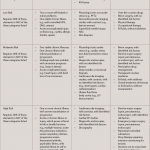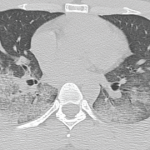Pediatric rheumatology patients present unique challenges. According to Kyla Driest, MD, MEd, using age and temperament appropriate methods, such as distraction or icing, may help children manage pain and ease anxiety…


Pediatric rheumatology patients present unique challenges. According to Kyla Driest, MD, MEd, using age and temperament appropriate methods, such as distraction or icing, may help children manage pain and ease anxiety…
Take the Challenge. ICD-10 Codes R76.1—Raised antibody titer L20.8—Other atopic dermatitis R20.2—Paresthesia of skin R20.1—Hypoesthesia of skin CPT Codes 99358 and 99359 Rationale The Centers for Medicare & Medicaid Services (CMS) typically does not allow separate payment for physician services that do not require face-to-face time with a patient, but as of Jan. 1, 2017,…

In Part 1 of this series, we covered the vital role of medical decision making in determining the final level to bill for a patient encounter. Medical decision making is the key component in coding because it reflects the intensity of the provider’s cognitive labor. This implies that there’s an unseen component involved in the…

MADRID—Tofacitinib (a JAK inhibitor) used with methotrexate (MTX) is not inferior to adalimumab (a TNF inhibitor) in rheumatoid arthritis (RA) patients who’ve had an inadequate response to MTX alone, according to results of a Phase 3B/4 trial presented in a session at the Annual European Congress of Rheumatology (EULAR). The findings came in a one-year…

Elizabeth Hofheinz, MPH, MEd |
It’s a bit ironic that when injured people are in pain—and their mobility is reduced—they are often expected to travel to a physical therapy clinic. For millions of people, such trips are a burden. In Australia, however, some patients are “letting movement come to them.” Novel research from The University of Melbourne shows that taking…

Payam Pourhassani, DO, MSc, Sneha Patel, MD, & Arundathi Jayatilleke, MD |
A 22-year-old Indian male presented to the emergency department with hemoptysis. A month prior, he had presented to an urgent care center complaining of cough with occasional episodes of blood-tinged sputum in the morning. He was diagnosed with community-acquired pneumonia based on a chest X-ray without laboratory testing and was prescribed levofloxacin. A few days…

Steady hands, nerves of steel: The endoscopic transphenoidal hypophysectomy is a delicate neurosurgical procedure. Using a three-dimensional microscope and a powerful magnetic resonance imaging machine to guide them, the surgeon must meticulously dissect the throat tissues, navigate through the palate and the sinuses to reach the base of the skull where the pea-sized master gland,…

In recent years, scientists and clinicians have learned a great deal about autoantibodies occurring in idiopathic inflammatory myopathies (IIMs). These new discoveries have reshaped our understanding of distinct clinical phenotypes in IIMs. Scientists continue to learn more about how these autoantibodies shape pathophysiology, diagnosis, disease monitoring, prognosis and optimum treatment. Moving forward, these autoantibodies will…

MADRID—Determining what is a best practice in rheumatology and then implementing improvements based on what you find can be fraught with complexity, an expert said during the 2017 Annual European Congress on Rheumatology (EULAR). Examples are emerging of benchmarking projects in which electronic registers are used to improve patient care, said William Dixon, MD, chair…

Patients with a diagnosis of rheumatoid arthritis (RA) experience on average double the risk of developing malignant lymphoma when compared with the general population. With the major changes in RA treatment taking place over the past decade, has there been a reduction in the risk of lymphoma in this population? Researchers from the Karolinska Institute…